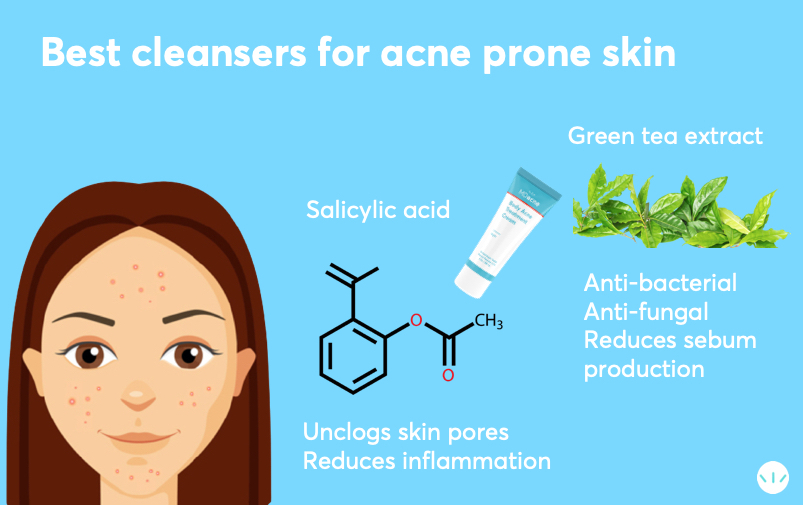Best cleansers for acne-prone skin

Washing your face is an essential part of an effective acne-fighting routine. Yet, many people with acne-prone skin end up using the wrong cleanser, leading to dryness, flakiness, and even more breakouts. This can be especially problematic for those with sensitive skin conditions like eczema or rosacea, making it crucial to choose the right type of acne cleanser. Cleansers come in gel, cream, and foam forms, each offering unique benefits for different skin types.
Benefits of Medicated Face Cleansers for Acne
Medicated cleansers for acne offer several advantages: they clear away dead skin cells, oil, and dirt, unclog pores, promote blood circulation, hydrate the skin, and enhance absorption of other skincare products.
Choosing the Right Cleanser for Acne-Prone Skin
-
Gel Cleansers are lightweight and refreshing but may not remove heavy makeup or be ideal for those with sensitive or dry skin.
-
Foam Cleansers provide a bubbly lather and can work well for oily or combination skin. However, they may lack the hydration needed for sensitive or acne-prone skin.
-
Cream Cleansers are best for sensitive, dry, or acne-prone skin. They offer gentle cleansing while keeping the skin hydrated. Look for formulas containing salicylic acid (BHA) to help with blackheads and acne.
Additional Cleansing Options
-
Micellar Water and Liquid Makeup Removers can be helpful for those who prefer wiping makeup off. However, it’s best to avoid leaving these on the skin as they may cause irritation.
-
Cleansing Oils and Double Cleansing can be too harsh for sensitive skin or acne-prone individuals, potentially stripping the skin’s natural barrier or clogging pores.
-
Cleansing Wipes are great for quick cleanses, especially when you’re on the go. Opt for oil-free wipes if you have acne-prone or rosacea-prone skin.
-
Avoid Bar Soaps as they are often too harsh, stripping away moisture and potentially worsening acne or irritation.
Medicated Cleansers with Salicylic Acid
Salicylic acid is a great option for unclogging pores and reducing inflammation. A 0.5% concentration works well for most skin types, while a 2% concentration is suitable for those with very oily skin or body acne.

Natural Ingredients in Acne Cleansers
Ingredients like green tea extract add anti-inflammatory and oil-reducing benefits. Studies show that green tea catechins can inhibit DHT, reducing sebum production and helping manage acne.
Benzoyl Peroxide Washes
While benzoyl peroxide is effective, it requires around 20 minutes on the skin to work best. Quick washes may not provide the full benefits, making leave-on benzoyl peroxide treatments preferable.
Cleansers for Post-Acne Dark Spots and Scars
Advanced acne cleansers with ingredients like licorice extract, green tea, and vitamins C and E can help fade dark spots, reduce redness, and support skin healing. Aloe vera can also add soothing hydration.
The right acne cleanser can make a significant difference, especially when customized to your skin type and needs.
Best cleanser for people with acne (face)
Best cleanser for people with body acne and very oily skin
To find the right acne treatments for your unique skin, take the free skin assessment by clicking here.



